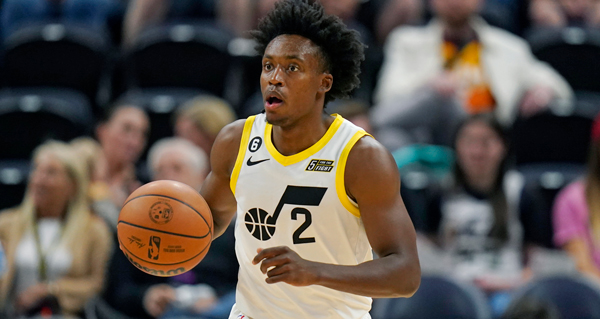We’ve seen this before. Parts of it, anyway—we’ve heard notes, even full riffs from this kind of composition, you might say. The Utah Jazz are off to a 3-0 start, and sit atop the Western Conference. They’ve gone through teams who most pundits had well ahead of them to get there, too; the Denver Nuggets, Minnesota Timberwolves, and New Orleans Pelicans. This, despite the team most likely being assembled, by team president Danny Ainge, to lose. After six straight playoff berths in a consistently brutal Western Conference, Ainge shipped out four of last year’s starting five, leading to a strange brew of players, all at various crossroads in their careers.
Iterations of the Boston Celtics have succeeded while being described similarly, under Ainge’s watch. Consider the 2016-17 version of the team, which made it all the way to the Conference Finals behind leading scorers Isaiah Thomas, Avery Bradley, and Jae Crowder; not exactly a “big three” collection of names. Kelly Olynyk was on the Celtics that year, too, and is now on the upstart Jazz. So is someone who joins Olynyk in his long-occupied space of elite, overlooked role players: Jarred Vanderbilt. Part of the yield from Minnesota in the Rudy Gobert trade—along with new Jazz sixth man microwave scorer, Malik Beasley—Vanderbilt is a tenacious and versatile defender and rebounder, with no compunction about his inglorious on-court deeds. Every fan wants someone like him on their team.
Add in Lauri Markkanen—a center-sized shooting guard who’s finally blossoming on his third team and in his sixth season, at the age of 25—holdover combo guards Mike Conley and Jordan Clarkson, quickly effective rookie big man Walker Kessler, and the always pesky Collin Sexton to close games with poise and panache, and you’ve got an extremely annoying team to deal with on a night-to-night basis. So far, they’ve undermined everyone’s expectations for them, perhaps even their own, and have done it without superstar talent. A true ensemble, the likes of which their rabid small market fanbase is culturally engineered to love, especially after saying goodbye to shiny star Donovan Mitchell, whose wandering eye for bigger destinations reached toxic levels by the end of his Salt Lake City stay.
It’s not just the sub-celebrity groups of Celtics that Ainge has previously put together that we have as precedent, though. We’ve seen ample other gangs of used parts arrive in a city that a huge name, or a few, has just left, and surprise the bejesus out of fans and analysts who have counted them out. The best case regular-season scenario, here, is the case study that is the 2012-13 Denver Nuggets; a 57-win corps of spicy performers who mostly came to town in exchange for Carmelo Anthony. Rarely has a roster with no one averaging even 17 points per game become such a juggernaut. Those Nuggets are a prime example for all post-superstar NBA assemblages, including this year’s Jazz.
But the more likely end result for this team is that of the 2020-21 Houston Rockets, who put together a six-game winning streak shortly after sending James Harden to the Brooklyn Nets, and then immediately lost 21 of their next 22 contests. Sometimes—most of the time, in fact—it just takes the league a week or two to catch up. It was impossible to effectively scout the Jazz before this past week, because although their component parts have all existed as known entities for years, the combination of them has not. And even if the Jazz prove their skeptics wrong, and keep at this for even longer than anticipated, Ainge is likely to do whatever is necessary to bring the team down to where everyone thought they’d land, by sending out as many of his more useful players as he can. Because while the Jazz got a boatload of draft equity back for all the good players they’ve already traded away, it will still take a lot of short-term losing to garner the high-end lottery picks that typically produce the kinds of players worth building a franchise around.
So, enjoy the music while it lasts. There are sweet melodies here that, once quashed, few will remember. For now, the Jazz are foraging a sound that only the true heads—not only of the NBA more broadly, but even within their own fanbase—will remember. Relatedly, our final example is the 2017-18 Chicago Bulls. A largely putrid, 27-win team, they somehow became one of the league’s best in December of that season, winning 10 out of 12 behind an inspired rotation including the likes of Markkanen, Justin Holiday, Nikola Mirotic, and true cult hero David Nwaba. Most basketball fans have no recollection of this—not even most Bulls fans do.
What some Bulls fans may remember, bitterly, though, if you dig deeply enough into their experience of their team five years ago, is that the fun winning streak arguably ended up costing them a shot at any of the 2018 draft class studs picked that June—most notably, Luka Doncic and Trae Young. They got Wendell Carter, Jr. instead: a nice late-bloomer type who, like Markkanen now, needed a change of scenery and a few extra seasons to show their real worth. That’s not what Ainge or the Jazz are after, though, and as such they are not content to see where this currently entrancing session goes. This noise must come to an end, and from that negative silent space, later, they will want something much louder to emerge.



